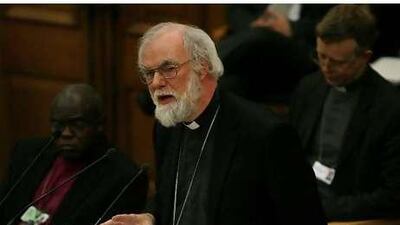LONDON // The Church of England was in disarray yesterday as traditionalists threatened to break away over the proposed consecration of female bishops. With the Anglican communion worldwide already split over the issue of homosexual clerics, the divisions in Britain over female bishops were expected to be papered over on Saturday with a compromise amendment put to the vote in the General Synod, the church's governing body.
But despite the fact that the amendment, which would have allowed traditionalist parishes to opt out of having a female bishop, was tabled by the archbishops of Canterbury and York, the church's most senior clerics, liberals rebelled and it was narrowly defeated. Members of the synod are now expected to approve the consecration of female bishops, putting them on an equal footing with men, in a vote today.
The amendment, similar to the opt-out clause adopted in 1992 when the church started ordaining women as priests, was intended to minimise the numbers of clergy tempted to convert to Roman Catholicism under a controversial offer made last year by Pope Benedict to "fast track" any traditionalists wanting to switch. After Saturday's vote at the meeting in York, the traditionalist Catholic Group in General Synod issued a statement showing the depth of its disquiet over the fact that all churches in any diocese could soon have a female bishop in charge.
"We deeply regret the General Synod has decided to ignore the leadership of the chief pastors of the Church of England: the archbishops of Canterbury and York," the statement said. "By rejecting the opportunity for unity the amendment would have achieved, it has made it very difficult for those who, in conscience, cannot accept the ministry for women priests and bishops." The traditionalists believe that only men should be clerics of any sort, pointing to biblical passages and the fact all Jesus's apostles were men. Liberals argue that, in an age of equality in modern society, women should have equal rights inside the church.
Commenting on the latest "damaging split", The Sunday Telegraph said yesterday that an unknown, but significant, number of church clerics and laity might now opt for Roman Catholicism. "Advocating that compromise required considerable courage from the two archbishops," it added. "They are convinced that it is right to consecrate women as bishops, but they were prepared to compromise in order to preserve the unity of the church."
However, Christine Allsopp, the archdeacon of Northampton, was one of a number of female priests who wrote to Rowan Williams, the archbishop of Canterbury, urging him not to put forward the amendment in the first place. "We recognise their good intentions in trying to help us all to hold together, but I do not believe that this was good news for women clergy," Allsopp wrote. Christina Rees, a leading campaigner for female bishops, said: "This amendment would have created a two-track system, the very thing that synod has made it clear that it does not want."
But David Houlding, a vicar from London and a leading member of Catholic Group in General Synod, said after the failure of the amendment: "I do not see where the future lies. "The Church of England is my home. It is where I belong. The problem is not that I might leave the Church of England. The problem is that I will be staying in the Church of England." Although Mr Williams insisted the vote was not a "loyalty test" on his leadership, the Mail on Sunday wrote that critics would seize on the outcome as fresh evidence of his "waning influence over a church already divided over gay bishops".
Mr Williams came under attack from liberals this month for failing to back the candidacy of Jeffrey John as bishop of Southwark. Mr John is openly gay, though celibate, and was favourite for the post. Critics accused Mr Williams of weakness in the face of objections by traditionalists to homosexual clerics although his supporters say he was only trying to avoid the sort of schism that has followed moves to appoint gay bishops by the Episcopal Church in the United States.
dsapsted@thenational.ae

